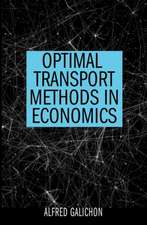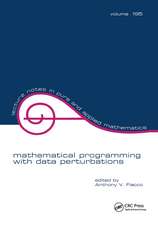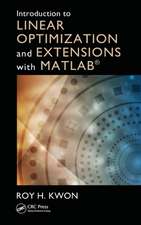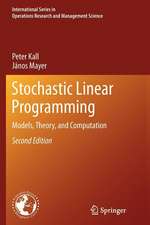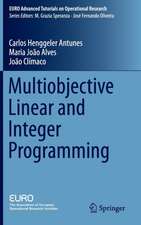Iterative Dynamic Programming: Monographs and Surveys in Pure and Applied Mathematics
Autor Rein Luusen Limba Engleză Hardback – 27 ian 2000
With iteration, dynamic programming becomes an effective optimization procedure for very high-dimensional optimal control problems and has demonstrated applicability to singular control problems. Recently, iterative dynamic programming (IDP) has been refined to handle inequality state constraints and noncontinuous functions.
Iterative Dynamic Programming offers a comprehensive presentation of this powerful tool. It brings together the results of work carried out by the author and others - previously available only in scattered journal articles - along with the insight that led to its development. The author provides the necessary background, examines the effects of the parameters involved, and clearly illustrates IDP's advantages.
Din seria Monographs and Surveys in Pure and Applied Mathematics
- 14%
 Preț: 930.38 lei
Preț: 930.38 lei - 15%
 Preț: 456.96 lei
Preț: 456.96 lei - 25%
 Preț: 1007.91 lei
Preț: 1007.91 lei - 20%
 Preț: 504.64 lei
Preț: 504.64 lei - 15%
 Preț: 485.98 lei
Preț: 485.98 lei - 30%
 Preț: 933.57 lei
Preț: 933.57 lei - 15%
 Preț: 488.43 lei
Preț: 488.43 lei - 15%
 Preț: 490.10 lei
Preț: 490.10 lei - 15%
 Preț: 484.37 lei
Preț: 484.37 lei - 15%
 Preț: 493.34 lei
Preț: 493.34 lei - 24%
 Preț: 370.27 lei
Preț: 370.27 lei - 24%
 Preț: 371.11 lei
Preț: 371.11 lei - 15%
 Preț: 483.54 lei
Preț: 483.54 lei - 15%
 Preț: 488.43 lei
Preț: 488.43 lei - 15%
 Preț: 485.18 lei
Preț: 485.18 lei - 15%
 Preț: 490.10 lei
Preț: 490.10 lei - 15%
 Preț: 489.26 lei
Preț: 489.26 lei -
 Preț: 389.38 lei
Preț: 389.38 lei -
 Preț: 385.84 lei
Preț: 385.84 lei - 15%
 Preț: 461.21 lei
Preț: 461.21 lei - 24%
 Preț: 357.87 lei
Preț: 357.87 lei - 15%
 Preț: 458.25 lei
Preț: 458.25 lei - 15%
 Preț: 489.26 lei
Preț: 489.26 lei - 15%
 Preț: 484.37 lei
Preț: 484.37 lei - 15%
 Preț: 676.52 lei
Preț: 676.52 lei - 25%
 Preț: 870.70 lei
Preț: 870.70 lei - 9%
 Preț: 1863.39 lei
Preț: 1863.39 lei - 9%
 Preț: 1039.32 lei
Preț: 1039.32 lei - 25%
 Preț: 635.75 lei
Preț: 635.75 lei - 26%
 Preț: 989.34 lei
Preț: 989.34 lei - 26%
 Preț: 765.43 lei
Preț: 765.43 lei - 28%
 Preț: 986.93 lei
Preț: 986.93 lei - 25%
 Preț: 1067.45 lei
Preț: 1067.45 lei
Preț: 1245.46 lei
Preț vechi: 1368.63 lei
-9% Nou
Puncte Express: 1868
Preț estimativ în valută:
238.35€ • 247.92$ • 196.77£
238.35€ • 247.92$ • 196.77£
Carte tipărită la comandă
Livrare economică 12-26 aprilie
Preluare comenzi: 021 569.72.76
Specificații
ISBN-13: 9781584881483
ISBN-10: 1584881488
Pagini: 342
Ilustrații: 57 tables and 700 equations
Dimensiuni: 156 x 234 x 24 mm
Greutate: 0.65 kg
Ediția:2003.
Editura: CRC Press
Colecția Chapman and Hall/CRC
Seria Monographs and Surveys in Pure and Applied Mathematics
Locul publicării:Boca Raton, United States
ISBN-10: 1584881488
Pagini: 342
Ilustrații: 57 tables and 700 equations
Dimensiuni: 156 x 234 x 24 mm
Greutate: 0.65 kg
Ediția:2003.
Editura: CRC Press
Colecția Chapman and Hall/CRC
Seria Monographs and Surveys in Pure and Applied Mathematics
Locul publicării:Boca Raton, United States
Public țintă
ProfessionalRecenzii
"This book provides a working knowledge of IDP with many worked out solutions for a wide range of problems. This is especially useful for graduate students and industrial practitioners because a strong background in mathematical techniques and chemical engineering is not essential for understanding this book. This book can be used in a university as a textbook at the level of seniors or first-year graduate students. Of course, this book is also suitable for academic researchers who need an alternative way to cross-validate their solutions to OCPs with their newly devised methods... It can be concluded that this text is a very good addition to the toolbox for numerical optimal control. It is expected that all engineers, graduate students, researchers who are involved in solving optimal control problems should know IDP - the new powerful OCP solution scheme."
-International Journal of Robust and Nonlinear Control, vol. 11, no. 14, December 15, 2001
-International Journal of Robust and Nonlinear Control, vol. 11, no. 14, December 15, 2001
Cuprins
Chapter 1: Fundamental concepts; Chapter 2: Steady-state optimization; Chapter 3: Dynamic programming; Chapter 4: Iterative dynamic programming; Chapter 5: Allowable values for control; Chapter 6: Evaluation of parameters in IDP; Chapter 7: Piecewise linear control; Chapter 8: Time-delay systems; Chapter 9: Variable stage lengths; Chapter 10: Singular control problems; Chapter 11: State constraints; Chapter 12: Time optimal control; Chapter 13: Nonseparable problems; Chapter 14: Sensitivity considerations; Chapter 15: Toward practical optimal control
Descriere
With iteration, dynamic programming becomes an effective optimization procedure for very high-dimensional optimal control problems and has demonstrated applicability to singular control problems. Recently, iterative dynamic programming (IDP) has been refined to handle inequality state constraints and noncontinuous functions. This book offers a comprehensive presentation of this powerful tool. It brings together the results of work carried out by the author and others with the insights and advances that led to its development. The author provides the necessary background, examines the effects of the parameters involved, and clearly illustrates IDP's advantages.





